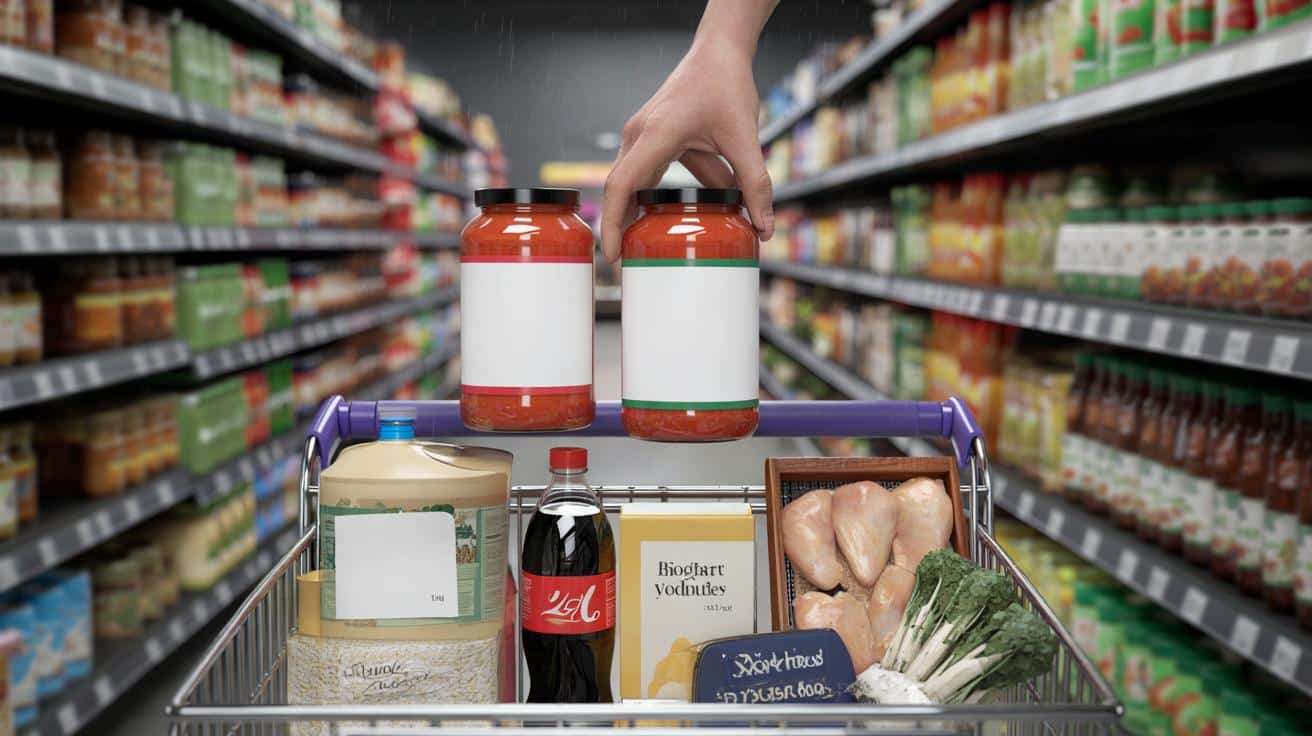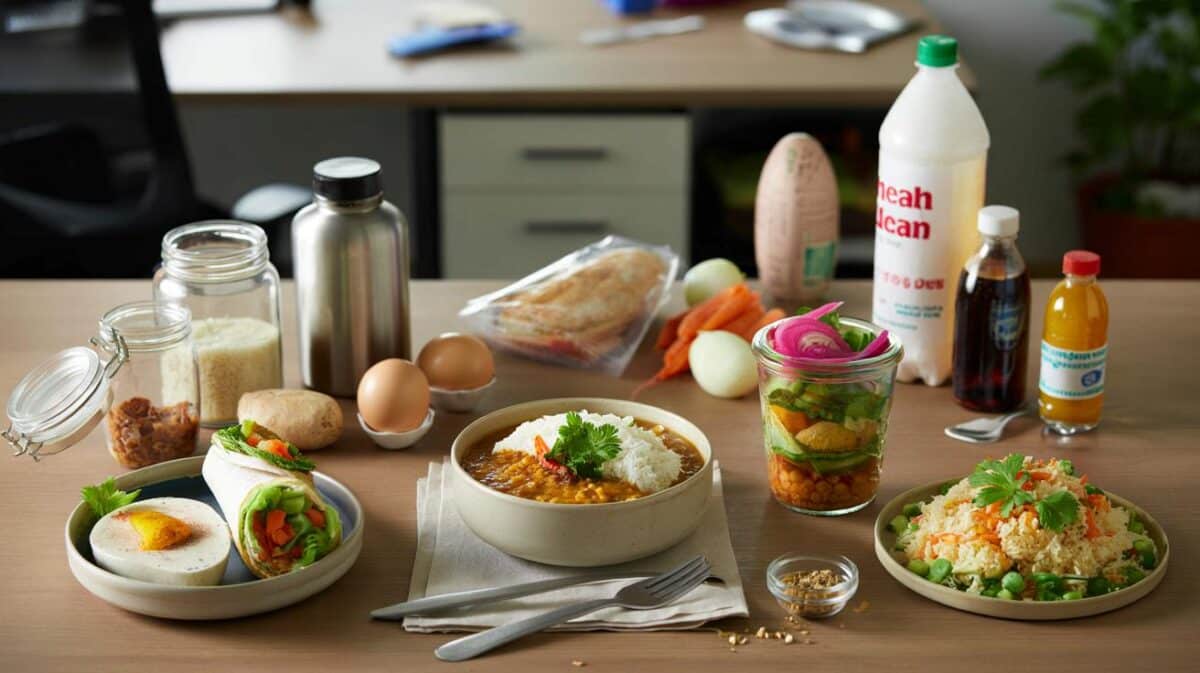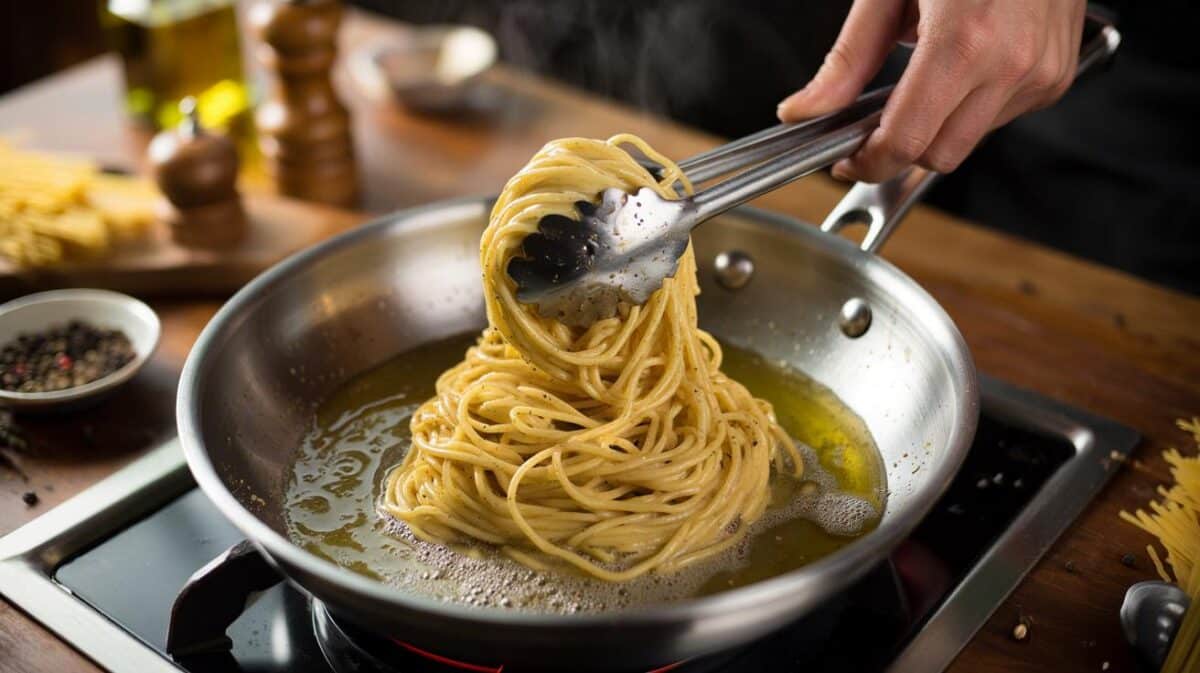Across Britain, a small shift is spreading: shoppers are saving around £20 a week by following one oddly simple habit. Swap just one item each time you shop — and let the savings stack quietly.
It starts in Aisle 7 on a drizzly Tuesday. You’re standing between two rows of saucy promises, loyal to the same red-labelled jar you’ve bought for years. To the left: the brand. To the right: the supermarket’s own. You flip the jars and stare at unit prices like a codebreaker. Your trolley doesn’t care about the logo. Your bank balance doesn’t either.
The man ahead throws a tenner into the self-checkout and sighs as the total climbs. He hasn’t noticed the smaller packs, the higher unit prices, the micro-creep. You notice. You place the own-brand jar on the scanner, and the screen blinks back a tiny victory. Just one swap.
The ‘swap one item’ rule, in real life
Here’s the rule that’s catching on: each shop, choose one regular item and switch it for the best-value alternative. One cereal. One laundry product. One cut of meat. That’s it. No dramatic couponing. No spreadsheet circus. One shift per shop, every shop.
It’s not flashy, and that’s the point. You sidestep decision fatigue by setting a tiny target. **One tiny habit beats a dozen big promises.** Over a month, those little choices dig a neat trench in your spending, often close to £20 a week for a family who buys the same 20–30 items on repeat.
Take Chloe in Leeds. She swapped a branded granola (£3.50) for own label (£1.75), pods for powder (down £2.10 per wash-week), chicken breast to thigh (£1.80 saved on a 1kg swap), and that familiar cola to the supermarket’s big bottle (about £1.25 saved). That one shop shaved £8–£10 without a fuss. The next shop, she swapped olive oil size (750ml to 1L) and picked a frozen veg trio instead of a pricey fresh mix, nudging the saving to roughly £18.60. The maths adds up faster than you think.
How the £20 stacks up
The trick sits in the “repeaters” — the items you buy every single week. You don’t need ten changes; you need one change repeated across time. Target anything with a unit price over 40–50p per 100g/ml if there’s a cheaper equivalent. Or target the brand you buy out of habit, not taste.
Unit price is your compass. Not the big yellow tag, not the two-for-£X noise. If the smaller pack is cheaper at the till but more expensive per 100g, you’re paying for air. **Real savings happen when swaps become keepers.** If the swap tastes fine and works, it graduates from “experiment” to “default”, and your weekly baseline drops again.
This is behaviour, not budgeting theatre. Small, low-friction choices glide past willpower limits. You don’t need to overhaul your food culture or cookbooks. You keep your meals; you change a barcode. It feels almost too easy.
How to make the swap every week
Before you shop, glance at last week’s receipt and circle one repeat spend over £3. That’s today’s swap. In-store, give yourself a two-minute rule: compare just one shelf with unit prices and pick the best-value option that you’re happy to eat or use. If you can’t decide, move on. The habit matters more than the perfect choice.
Let’s be honest: nobody actually does that every day. Still, one-tiny-decision beats guilt. We’ve all had that moment when the total hits the till and you realise the “little extras” were not so little. Start with easy wins: brand-to-own for sauces, pre-grated to block cheese, small bag to family-size rice, breast to thigh, fresh to frozen berries, pods to powder. Keep a note in your phone called “keepers” for swaps you loved, so you don’t have to rethink them.
You’ll taste-test a dud now and then. That’s part of it. If a swap flops, revert next time and try another line. **Your trolley should feel familiar, just a touch smarter.**
“The single-item swap nudges people past analysis paralysis. One change becomes two, then five. That’s how households are finding £15–£25 a week without feeling deprived.” — Maya Patel, community money coach
- Cola: big-brand 2L to supermarket 2L — save ~£1.00–£1.50
- Yoghurt: 4x125g pots to 1kg tub — save ~60–90p and cut plastic
- Cheese: pre-grated 300g to 400g block — save ~£1 and melt better
- Chicken: breast to thigh/drumsticks — save ~£1.50–£2 per kilo
- Herbs: fresh bunch to frozen chopped — save ~80p and reduce waste
- Laundry: pods to powder — save ~8–12p per wash
The ripple effect on your budget
Once you’ve banked two or three swaps that stick, your baseline shrinks. That £20 cushion has jobs to do: covering a surprise school trip, topping up gas, or funding a Sunday roast that feels like a treat again. The swap doesn’t force you to “go without”; it funds the things you’d rather keep.
Soyons honnêtes : personne ne fait vraiment ça tous les jours. Aim for most weeks. If you shop twice weekly, that’s two swaps. If a week is chaotic, skip it and start again. The habit is elastic, and that’s why it lasts.
Share wins with friends or neighbours — people love a good “this own-brand is actually better” tip. That social proof lowers the risk in your head and makes the next swap easier. Keep it playful. You’re not doing homework; you’re pocketing quid.
What this changes for your routine
There’s something human here: the quiet relief of spending less without shrinking your life. When the swap rule becomes second nature, you notice you’re less twitchy at the till. You cook the same curry, pour the same cereal, and no one complains. The stress loosens.
What’s interesting is how it spreads. You upgrade where it counts — the bread the kids actually eat, the olive oil you taste raw — and you save on the background stuff. A small supermarket habit turns into a gentle money system that runs in your head without effort. That’s where the real win sits.
Maybe your swap pays for a midweek coffee you stopped buying months ago. Maybe it clears a tiny bit of debt. Maybe it’s just air in the month. There’s no ceremony. Just a quieter shop, a lighter receipt, and the hush of a weekly bill that doesn’t sting as much.
| Point clé | Détail | Intérêt pour le lecteur |
|---|---|---|
| The one-swap rule | Change a single repeat item each shop to a cheaper, acceptable alternative | Actionable in two minutes, no complex budgeting required |
| Unit price beats label hype | Compare per 100g/ml rather than headline price or promos | Prevents shrinkflation tricks and fake deals from costing you |
| Keepers list | Save swaps you liked so they become your default | Compounds savings to around £20/week without constant effort |
FAQ :
- How much can I realistically save?Most households see £10–£25 a week once two to four swaps stick. It builds as your “keepers” list grows.
- Will I have to sacrifice quality?Not across the board. Many own-label lines match or beat brands. Taste-test one line at a time and keep what passes your table.
- What if we’ve got dietary needs?Use the rule inside your category. Swap brand-to-own within gluten-free, lactose-free, or vegan options, or switch pack sizes for better unit value.
- Does this work for online shopping?Yes. Sort by unit price, add a couple of own-labels to try, and tag favourites you approve. Repeat the winners.
- What if I love a specific brand?Protect your non-negotiables. Swap background items instead — cleaning products, tinned goods, frozen veg — and you’ll still hit the weekly saving.










Brilliant tip—swapped pods to powder and shaved £4 this month alredy. Cheers! 🙂